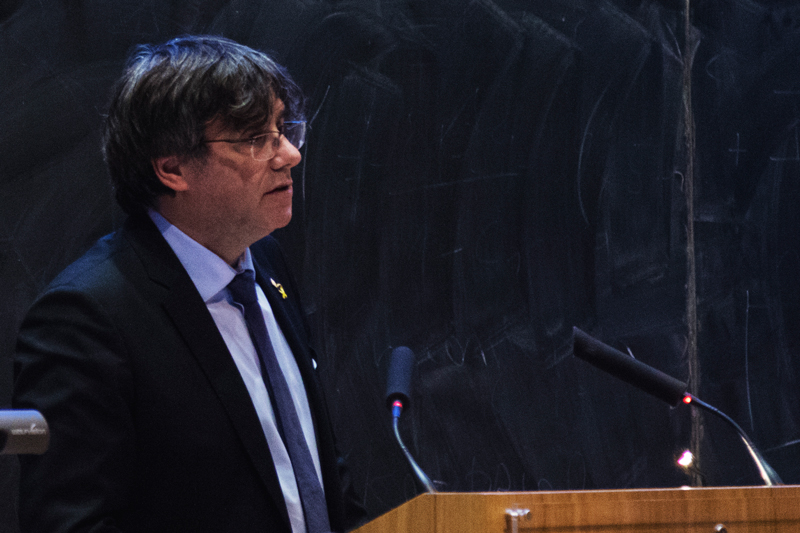Perhaps unsurprisingly, it didn’t take long for last night’s talk with Carles Puigdemont – organised by Trinity Research in Social Sciences (TRiSS) and the School of Social Sciences and Philosophy – to get political.
The exiled former president of the government of Catalonia – and, to many, the face of the Catalan independence movement – was greeted by a standing ovation as he entered a packed Edmund Burke theatre. Catalonian flags were waved, there was even whistling.
Those hoping for this dramatic atmosphere to continue throughout the evening’s discussion, however, would have been disappointed, but probably not bitter. Instead of a political rally, the audience was met with informative, if sometimes heavy, talks from economists and political scientists, all circling around issues of secession, independence and democracy.
Indeed, in many ways, it felt like an evening of two halves. After a lengthy, impassioned speech from Puigdemont, outlining the history of Catalan secession movements, and discussing separatism as “only way to guarantee the survival of the values of our community”, discussion focused on the economic viability of secession movements, the role of fiscal contracts in post-colonial societies, and the origins of theories of self-determination.
One the one hand, the idealism and radical experience of Puigdemont filled the room with a palpable excitement. His discussion of the ways in which Francoist thought still impacts Spanish society, for example, was met with audible yells of support, while his analysis of various forms of legitimacy, in Spain, the European Union, and liberal democracies generally, encouraged no shortage of nodding heads. Responding to an audience member’s question of “what next?” he replied simply “democracy”.
The other side of the coin, however, saw the more academic perspective of the later speakers bring things soberingly back down to earth. Policy considerations were put to the fore, and political economy became the chosen frame of reference. “This is not a normative talk. I stay away from those in general”, explained Dr Emanuel Coman, the final speaker of the night, “it’s very pragmatic”. But normative talk was the bread and butter of what Puigdemont came ready to discuss.
This is not to say that the other speakers stayed away from political relevance. Politically charged topics, it seems, were almost impossible to avoid. Dr Marvin Suesse, of the Trinity economics department, made repeated references to Irish republicanism, both in a modern sense and in its historical context. Political science academic Dr Michelle D’Arcy, meanwhile, discussed complex issues of secession in the Congo. Brexit, Crimea, the gilets jaunes, all got a look in amidst reference to economic models and graphs of territory changes.
There was clearly a market for this. Questions from the audience referred to everything from the growth of right-wing populism to Quebecois movement in Canada. The audience came ready to discuss weighty political issues, and in a real sense, that is what they got.
Something that was perhaps less expected, however, was a history lesson. Distinct from analysis of contemporary political issues, the varied speeches on offer all had something a historical bent to them. This was particularly important for Puigdemont, who repeatedly referred to “Catalan culture”, whether making a justification for Catalan opposition to centralised taxes or praising the history of non-violent protest. Coman discussed the history of the Ottoman empire, while Ireland’s own history of independence struggle was regularly alluded to. If the night had a theme, it was the connection between the major political upheavals of today, and everything that has gone before it.
But trying to settle on a theme for the night is a difficult, and ultimately fruitless task. If anything, it was an evening characterised by distinction and contradiction. The distinction between grassroots political idealism and academic distance, between contemporary politics and social history, between discursive conversation, and analytic argument. This overarching narrative was evident even in the more casual points speakers made. At one stage, Coman stressed the difference between emotion and rationality, tentatively encouraging a balance between the two. D’arcy, towards the end of the evening, discussed the distinction between a democrat, a liberal and a cosmopolitan. “If you are all these things”, she concluded, “then you’re probably in the middle of a nervous breakdown”.
The result, if one can call it that, was an evening of lively discourse which, while not entirely cohesive, was always fascinating. Chairing the event, Prof Gail McElroy reminded the audience that “universities are places of free speech – they’re where difficult conversations should take place”. If encouraging difficult conversation was the night’s aim, then it was an undoubted success.







